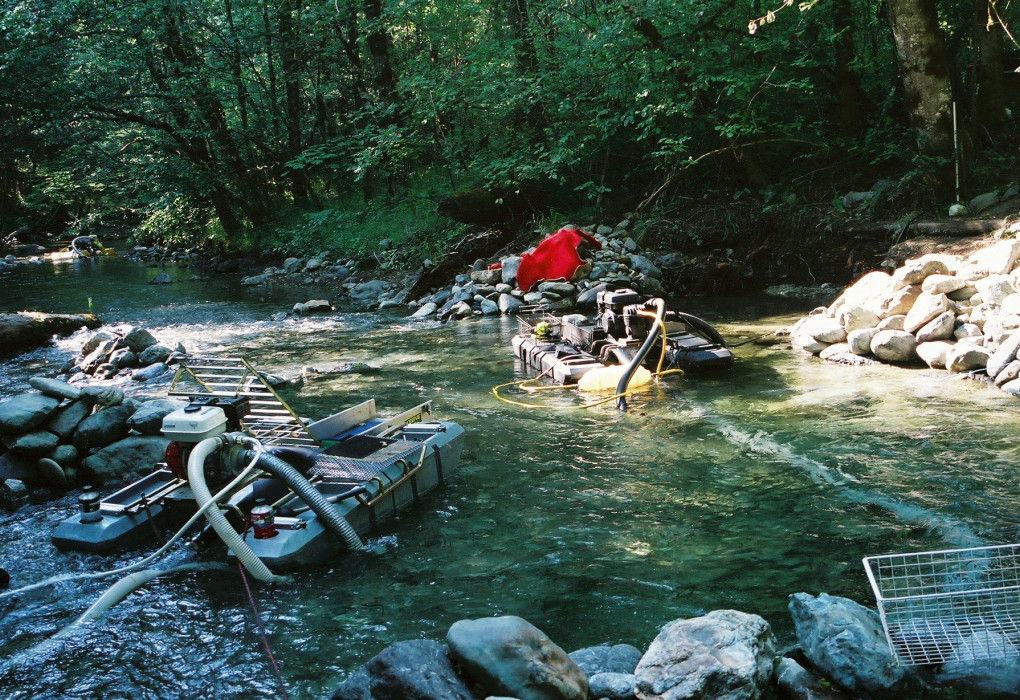Suction Dredge Mining Reform passes Oregon House of Representatives
May 31, 2017
Salem, OR – The Oregon House passed legislation today in a bipartisan vote to protect sensitive salmon and lamprey habitat from suction dredge mining. The Suction Dredge Reform bill (SB 3-A) takes a measured approach to protecting the most sensitive rivers and streams from the impacts of suction dredge mining, while still allowing suction dredges in areas where they do less harm.
“Clean water and healthy salmon define our state and the rivers we love,” said Charles Gehr of Fly Water Travel. “The recreation industry is a vibrant and sustainable economic model for Oregon and this bill helps protect the streams that are the most vulnerable to suction dredge mining impacts.”
Suction dredge mining is a form of recreational gold mining that uses a motorized, floating dredge to suck up the riverbed. Multiple scientific studies show that suction dredge mining can trap and kill young fish and fish eggs, release fine sediments that smother spawning gravel for salmon, and even stir up legacy mercury from historic mining operations.
“The scientific literature demonstrates a broad array of negative effects of suction dredge gold mining. It clearly works against efforts to recover salmon runs,” said Matt Sloat, Director of Science for Wild Salmon Center.
The Suction Dredge Reform bill is the result of a long and collaborative process championed by the late Senator Alan Bates from southern Oregon. It represents a compromise, informed by input from anglers, conservation groups, local businesses, the mining industry, and others.
“For the last four years, local communities across Oregon have called for reform on harmful suction dredge mining practices,” said Jake Crawford of the Native Fish Society, “and this legislation represents a workable, long-term solution to protect the state’s sensitive fish populations.”
Clean rivers that support healthy fish and vibrant recreation are critical to state and local economies. In 2008, the Oregon Department of Fish and Wildlife found that people spent $2.5 billion on fish and wildlife recreation in the state. The commercial fishing industry also relies on healthy rivers and salmon.
“Suction dredging, in the wrong places, can have devastating impacts on Oregon’s valuable salmon runs and destroy commercial salmon fishing jobs,” said Glen Spain, NW Regional Director of the Pacific Coast Federation of Fishermen’s Associations (PCFFA), representing major fishing industry trade associations. “Many key Oregon salmon streams are slowly being restored, but hundreds of suction dredges descending on these streams every year could easily undo tens of millions of dollars worth of taxpayer-funded salmon restoration work. This bill achieves a better balance, simply by pulling suction dredges out of vulnerable salmon nurseries, and moving them to where they would do far less economic and biological harm.”
Under the Suction Dredge Reform bill, suction dredge mining is prohibited in spawning and rearing habitat for sensitive, threatened, or endangered salmonids and lamprey, termed “essential salmonid habitat.” Outside of these areas, suction dredge mining would be allowed under a Department of Environmental Quality (DEQ) permit that places certain limits on where and how suction dredges can be operated in streams.
“This bill provides a sustainable approach that is grounded in science to limit negative impacts on wild fish populations in Oregon and their habitat,” said Tom Wolf of the Oregon Council of Trout Unlimited.
This bill establishes a permanent regulatory framework to manage suction dredge mining. In 2013, the Legislature first recognized the need to better protect sensitive species when it passed a bill to study the issue and implement a temporary moratorium in salmon and bull trout habitat.
“Right now, temporary protections for the most sensitive streams end in 2021,” said Stacey Detwiler of Rogue Riverkeeper. “Today’s vote is critical for the health of Oregon’s rivers and the communities that rely upon them.”
“We commend the Senate for working with all the stakeholders to craft such a reasonable approach to allowing mining while protecting our sensitive species,” said Paige Spence of the Oregon League of Conservation Voters. “I think Senator Bates would be pleased.”
Contact
Jake Crawford, Native Fish Society, (503) 344-4218
Tom Wolf, Oregon Council Trout Unlimited, (503) 640-2123
Paige Spence, Oregon League of Conservation Voters, (404) 583-8726
Glen Spain, Pacific Coast Federation of Fishermen’s Associations (PCFFA), (541) 521-8655
Stacey Detwiler, Rogue Riverkeeper, (541) 488-9831
Bob Van Dyk, Wild Salmon Center, (503) 504-8471
Watersheds
- 15 Mile Creek
- Bear Creek
- Chetco River
- Clackamas River
- Crooked River
- Hood River
- Hunter Creek
- Illinois River
- John Day River
- Johnson Creek
- Lost River
- Lower Columbia Tributaries
- Lower Deschutes
- McKenzie River
- Metolius River
- Molalla River
- Necanicum River
- Nehalem River
- Nestucca River
- North Santiam River
- North Umpqua River
- Rogue River
- Salmon River
- Salmonberry River
- Sandy River
- Siletz River
- South Umpqua River
- Sprague River
- Sycan River
- Umpqua River
- Upper Deschutes River
- Warm Springs River
- Williamson River
- Wilson River
- Winchuck River
- Yaquina River
- Zigzag River
